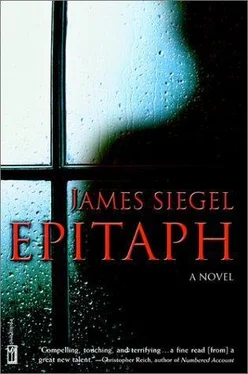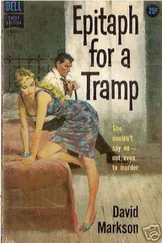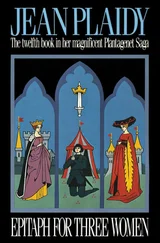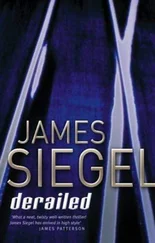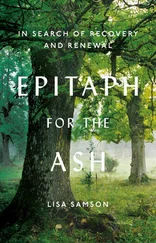James Siegel - Epitaph
Здесь есть возможность читать онлайн «James Siegel - Epitaph» весь текст электронной книги совершенно бесплатно (целиком полную версию без сокращений). В некоторых случаях можно слушать аудио, скачать через торрент в формате fb2 и присутствует краткое содержание. Жанр: Триллер, на английском языке. Описание произведения, (предисловие) а так же отзывы посетителей доступны на портале библиотеки ЛибКат.
- Название:Epitaph
- Автор:
- Жанр:
- Год:неизвестен
- ISBN:нет данных
- Рейтинг книги:4 / 5. Голосов: 1
-
Избранное:Добавить в избранное
- Отзывы:
-
Ваша оценка:
- 80
- 1
- 2
- 3
- 4
- 5
Epitaph: краткое содержание, описание и аннотация
Предлагаем к чтению аннотацию, описание, краткое содержание или предисловие (зависит от того, что написал сам автор книги «Epitaph»). Если вы не нашли необходимую информацию о книге — напишите в комментариях, мы постараемся отыскать её.
Epitaph — читать онлайн бесплатно полную книгу (весь текст) целиком
Ниже представлен текст книги, разбитый по страницам. Система сохранения места последней прочитанной страницы, позволяет с удобством читать онлайн бесплатно книгу «Epitaph», без необходимости каждый раз заново искать на чём Вы остановились. Поставьте закладку, и сможете в любой момент перейти на страницу, на которой закончили чтение.
Интервал:
Закладка:
He was looking right at him. William was convinced of it. Of course he was. Staring right at him like a hunter gauging the distance to his prey. William should run, scram, throw away his cane and crawl on all fours if he had to. Dr. Fern was death, and death was calling for him.
But Dr. Fern was only looking at the sky, shading his eyes as if searching for land. He wasn't looking at William after all.
William pressed back against the brittle weeds, relief washing over him like a sudden rain shower. He shivered; imagine, this close to death and still scared stiff. Scared stiff because he was this close to death, right across the street from it, within hailing distance.
The gardener was back now, gesturing at the flowers as if willing them to bloom. Dr. Fern walked over and said something else to him.
He seemed just a little bored with him; he listened to the doctor like you listen to someone else's child. Which, with William, had always been every child, always someone else's, not his and Rachel's. And now he wondered if she'd really had one, their child, and if she'd had it, if it really was theirs. That's why he'd never really tried to find out of course. Because he might've found out that their child, wasn't, was Santini's instead, conceived on a sweaty night in the Par Central Motel. That's why he never mailed the letters, why he picked up the phone without dialing a single number or uttering a word. Thirty-five years, and he couldn't get that picture out of his head. Just like Jean, who couldn't get a picture out of his head either, an image of pale dust settling like snow on a cell in the bowels of hell. Of a doctor who made you ill.
This doctor, the kindly Dr. Fern, whom the gardener was shrugging off like a gnat, as if he wasn't interested in what the doctor had to say because he'd heard it all before maybe, because he had more important things on his mind. The garden and the weeds.
William was still shivering, suddenly cognizant of his own rancid odor, like something dead, like something almost dead.
The gardener walked off, then came back with a single bag of charcoal. So Dr. Fern was having a barbecue, a quiet barbecue in the garden complete with weiners and roasted marshmallows maybe. But where was the grill?
The gardener unloaded the bag; it hit the ground with a sound like muffled thunder. The kind of thunder that's still far away but getting closer by the minute. The kind you huddle against in a quiet corner of your room.
Where was the grill?
Something was wrong. The gardener was upset about something, he was pointing at the ground and motioning to the good Dr. Fern. Ah, the bag had broken, that's all. A little of its charcoal had seeped out in a thin white line.
There wasn't a grill to be seen.
Dr. Fern was helping him out now, helping the hired help, smoothing the spilled charcoal into the soil now, cleaning it up.
There wasn't a grill anywhere.
Okay, fine. Because there wasn't any charcoal either.
Charcoal, after all, is black.
Other things are white. But not charcoal.
Like lime. Lime is white. And ash. Ash is white. Ash white.
So maybe Dr. Fern wasn't having a barbecue after all.
He dreamed about Rachel that night. A dream that left him tired and melancholy. It was a dream of something true, of something that had happened early in their marriage. A frigid winter's day, the morning after an ice storm had left everything coated in crystal. There's the happy couple, cozy as bugs in a rug. Home, with nothing much to do, nothing, that is, except cuddle and snuggle and whisper about the future, they go out for food-Mr. and Mrs. Squirrel foraging for nuts. It's a ten-block walk to the nearest grocery store, the ground as slippery as freshly waxed tile. They nearly skate there, pulling and propping each other up like the Protopovovs all the way to the store and back. They never quite let go of each other's arms, they never separate for more than an instant, they're one another's lifelines for as long as they're out there.
Later, propped up in bed surrounded by absolute silence, it seemed to William that they never needed each other quite as much as they did that day. They made it through an ice storm, but life had proved far more slippery. And life was very much on his mind right now. Life as a palpable, measureable, and ownable thing. As something that could be lost, given up, taken, stolen, thrown away, screwed up, or sacrificed. Take your pick. The doctor, for instance, had taken. Alma Ross, Arthur Shankin, Doris Winters had lost theirs. Jean had, of course, taken too. And then, when his own life had seemed all but lost, he'd tried to take it back. And where did William fit in? Had he thrown away his? Thrown it away somewhere in the pawpaw patch, somewhere between losing Rachel and losing hope, between a shattered heart and a shattered shoulder. Somewhere there. And when it's that far gone, can you ever find it, short of a miracle, that is?
Perhaps you start by starting. And though he'd started and stopped and stopped and started like the rusted engine he was, he was now at a fine hum, all pistons go, ready to roll. Today, for instance, he'd been a very busy beaver.
He'd paid a visit to Mr. Weeks. Paid him a visit, and told him everything, starting with Florida and ending with Fern. He'd left him with names, numbers, and one very simple instruction. If William failed to call him by noon tomorrow, Weeks was to call the police. They'd shook on it in the hallway, Mr. Weeks's hand as smooth and translucent as wax paper.
Back at the apartment building, where Mr. Leonati scolded him for not resting his leg and asked his opinion on which tour he should take this fall-the Sardinian Splendor or Norwegian Nights-he'd gone upstairs to find Mr. Brickman listening to a tape.
Hello Grandpa, the tape said, this is Laurie…
Mr. Brickman had taped it off the phone. Just to listen to, he said, from time to time. Then, looking a little embarrassed, he said, If I ever want to, that is…
William had just needed a minute of his time.
If he, William, should ever not return to his room- tomorrow, the next day, or any day, Mr. Brickman was to look in the top drawer of his dresser. There would be a will there. Also-he was to call a Mr. Weeks. That's all.
But Mr. Brickman, of course, wanted to know what all the mystery was about, all the morbid mystery. My heart, William told him. It's been giving me trouble. Mr. Brickman said he understood. Then had come the hardest part. He'd never written a will. Rachel had left him while they were still more or less young-after her, there'd been no one else, of course, to provide for. He found a piece of paper stuck between a magazine, took it over to his bed, then stared at it for over half an hour. Then a word.
I.
He pondered that word for a long time-it seemed to stand for so very little. It seemed to point a finger at him. So in the end, he just gave up.
First, a light. A small cool oval, like a winter's sun. It didn't radiate warmth as much as dread. It turned his dream sour, curdled its mood, which had been syrupy-sweet and achingly familiar. A summer's day with Rachel transformed into a January's solitude. That fast. Then, a slight pinch on his upper arm. Someone was pinching him but no one was there. So the dream adapts. It's his father, his mother; it's Aunty Em. Rachel? She's not there, she's back amid the bouquets of August. Can't have her back. Gone. So the dream evaporates like water held too close to the light. And he's suddenly, miserably, awake. The light is a penlight. That's what he noticed first. He was in the process of being examined. "Who are you?" he said, or at least thought he said, but the remarkable thing is, he didn't hear himself say it. He could swear he said the words, but he could also swear they never left his mouth. He could swear both.
Читать дальшеИнтервал:
Закладка:
Похожие книги на «Epitaph»
Представляем Вашему вниманию похожие книги на «Epitaph» списком для выбора. Мы отобрали схожую по названию и смыслу литературу в надежде предоставить читателям больше вариантов отыскать новые, интересные, ещё непрочитанные произведения.
Обсуждение, отзывы о книге «Epitaph» и просто собственные мнения читателей. Оставьте ваши комментарии, напишите, что Вы думаете о произведении, его смысле или главных героях. Укажите что конкретно понравилось, а что нет, и почему Вы так считаете.
